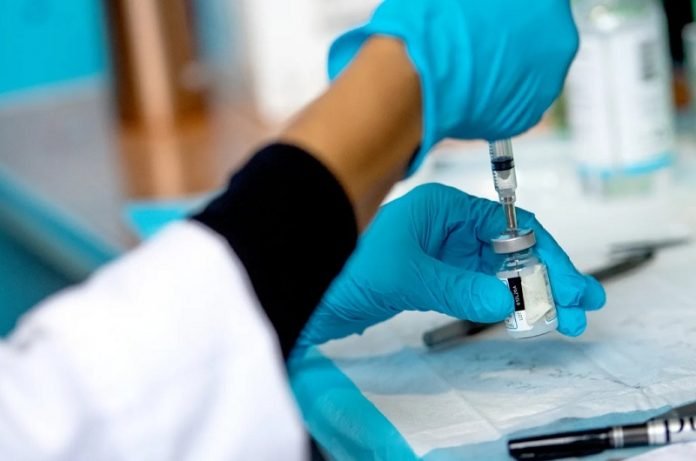
Experts say individuals recently vaccinated against or infected with COVID-19 should hold off for a few weeks before getting the newly approved, updated booster shot that targets the Omicron variant.
Millions of Americans are eligible for the boosters approved Aug. 31 by the U.S. Food and Drug Administration.
On Sept. 1, the Centers for Disease Control and Prevention recommended the use of the updated Pfizer shot for people ages 12 and up and Moderna shot for people ages 18 and older.
CDC Director Dr. Rochelle P. Walensky urged individuals who are eligible to get the booster and said in a press release, “There is no bad time to get your COVID-19 booster.”
Massachusetts state public officials say the boosters will be available in the Bay State Monday.
But they also told COVID-19 vaccine providers in a Sept. 1 email to give recently vaccinated and boosted individuals at least two months between their last shots and injection with the new booster.
In addition, individuals recently infected with COVID-19 should consider waiting at least a few weeks before getting the updated jabs, according to two professors at Northeastern University.
“It’s not going to hurt anyone” to get the booster too soon, says Brandon Dionne, associate clinical professor at Northeastern’s School of Pharmacy.
“It may be less beneficial to anyone who has had a recent COVID infection,” he says. The limited data that’s available suggests the booster may not prompt as strong an antibody response to the virus in a recently infected person.
Naturally occurring infections bring about their own antibody response, and Mansoor Amiji, distinguished professor in Northeastern’s departments of pharmaceutical sciences and chemical engineering, says recently infected people should delay getting the updated booster until that response wanes.
“You are already protected,” for a while, he says.
While Amiji says he advises people to wait at least four months after a COVID infection to get the booster, Dionne says his research indicates the wait time should be more like two to three months.
“The spacing is important,” Amiji says.
After the vaccine first came out in late 2020, he says he heard stories of people going from place to place to get six to seven shots. “Look, it doesn’t help.”
The updated Pfizer and Moderna boosters received approval as schools open for the fall, leading to a time of year when respiratory infections traditionally go up.
The CDC says COVID-19 cases, hospitalizations and deaths are trending downward, but last week there were more than 117,000 cases and over 800 deaths nationwide.
CDC officials say they expect to recommend updated COVID-19 boosters to an expanded age group of children soon.
The updated boosters provide protection both against original COVID and the highly contagious Omicron subvariants currently prevalent in the United States, which is why they are called bivalent boosters as opposed to the original monovalent vaccine and boosters.
CDC officials say that adding Omicron BA.4 and BA.5 spike protein components to the vaccine composition will help “restore protection that has waned since previous vaccination by targeting variants that are more transmissible and immune evading.”
One question on everyone’s mind is how effective the new booster will be in preventing disease.
“It’s a tricky question,” Dionne says. “So far the only data is from mice. It probably will have some impact. It can only be beneficial.”
“I’ve always been skeptical about the effectiveness of variant-oriented vaccines,” Amiji says, noting that by winter another variant may emerge.
“We may be working with a moving target,” he says.
Dionne says he doesn’t have any concerns about the safety of the updated boosters because they are built on a platform established by the original vaccines, which underwent lengthy testing.
The reformulation involved “tweaking” the technology, Dionne says.
It’s okay for people to get boosted with Moderna if they’ve been vaccinated and boosted with Pfizer, and vice versa, or to get the updated booster from Moderna or Pfizer if they’ve had the Johnson & Johnson single shot or booster in the past, says Amiji, who noting that the Moderna and Pfizer mRNA shots have proven more effective.
“You want to get the one that’s available in your pharmacy,” he says.
People getting boosted now will not have a choice between the old and updated formulas, because the FDA says the original monovalent booster will no longer be available.
It looks as though people will benefit from being boosted approximately every six months, in the absence of a naturally occurring COVID infection, Amiji says.
Dionne says he doesn’t see the demand for the updated boosters approach anything like the clamor for the COVID vaccines when they first came out.
It’ll probably be more like the demand for the flu vaccine during influenza season—and, like the flu shot—the booster may end up being an annual ritual, Dionne says.
Amiji says he understands people’s questions about the efficacy of the new booster, but he plans on getting the shot.
“Any extra protection is better than none.”
If you care about COVID, please read studies about a universal antibody therapy to fight all COVID-19 variants, and this face mask can capture and deactivate COVID-19 virus.
For more information about COVID, please see recent studies about people who are 5 times more likely to get COVID-19, and results showing Flu, COVID-19, and related vaccines may increase heart disease risk.
Written by Cynthia McCormick Hibbert.



